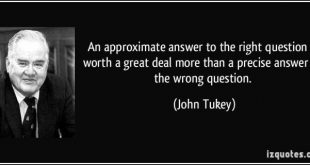Causality and analysis of variation Modern econometrics is fundamentally based on assuming — usually without any explicit justification — that we can gain causal knowledge by considering independent variables that may have an impact on the variation of a dependent variable. This is however, far from self-evident. Often the fundamental causes are constant forces that are not amenable to the kind of analysis econometrics supplies us with. As Stanley Lieberson...
Read More »Covariance algebra (student stuff)
Covariance algebra (student stuff) . [embedded content]
Read More »Instrumental variables (student stuff)
Instrumental variables (student stuff) . [embedded content]
Read More »Econometrics in the 21st century
Econometrics in the 21st century . [embedded content] If you don’t have time to listen to all of the presentations (a couple of them are actually quite uninformative) you should at least scroll forward to 1:39:25 and listen to what Angus Deaton has to say. As so often, he is spot on! As Deaton notes, evidence-based theories and...
Read More »Kausalitet och statistik
I The Book of Why för Judea Pearl fram flera tunga skäl till varför den numera så populära kausala grafteoretiska ansatsen är att föredra framför mer traditionella regressionsbaserade förklaringsmodeller. Ett av skälen är att kausala grafer är icke-parametriska och därför inte behöver anta exempelvis additivitet och/eller frånvaro av interaktionseffekter — pilar och noder ersätter regressionsanalysens nödvändiga specificeringar av funktionella relationer mellan de i...
Read More »Simpson’s paradox
[embedded content] From a theoretical perspective, Simpson’s paradox importantly shows that causality can never be reduced to a question of statistics or probabilities. To understand causality we always have to relate it to a specific causal structure. Statistical correlations are never enough. No structure, no causality. Simpson’s paradox is an interesting paradox in itself, but it can also highlight a deficiency in the traditional econometric approach towards...
Read More »Conditional exchangeability and causal inference
Conditional exchangeability and causal inference In observational data, it is unrealistic to assume that the treatment groups are exchangeable. In other words, there is no reason to expect that the groups are the same in all relevant variables other than the treatment. However, if we control for relevant variables by conditioning, then maybe the subgroups will be exchangeable. We will clarify what the “relevant variables” are, but for now, let’s just say...
Read More »Checking your statistical assumptions
Checking your statistical assumptions The assumption of additivity and linearity means that the outcome variable is, in reality, linearly related to any predictors … and that if you have several predictors then their combined effect is best described by adding their effects together … This assumption is the most important because if it is not true then even if all other assumptions are met, your model is invalid because you have described it incorrectly....
Read More »How scientists manipulate research
How scientists manipulate research [embedded content]All science entails human judgment, and using statistical models doesn’t relieve us of that necessity. Working with misspecified models, the scientific value of significance testing is actually zero — even though you’re making valid statistical inferences! Statistical models and concomitant significance tests are no substitutes for doing real science. In its standard form, a significance test is not the...
Read More » Heterodox
Heterodox






